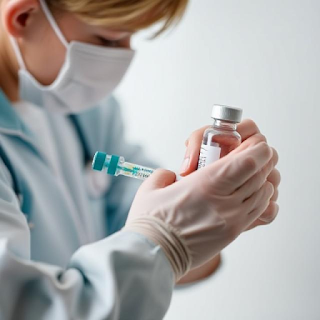- Get link
- X
- Other Apps
- Get link
- X
- Other Apps
Introduction
Immunizations, also known as vaccinations, are one of the most effective ways to prevent infectious diseases. They have saved millions of lives worldwide by boosting immunity and preventing the spread of deadly diseases like measles, polio, and influenza.
In this article, we’ll cover:
✔️ What immunizations are and how they work
✔️ Types of vaccines and their benefits
✔️ Recommended immunization schedules
✔️ Myths vs. facts about vaccines
✔️ How to stay up-to-date with immunizations
What Are Immunizations?
Immunizations are medical treatments that help the body develop protection against infectious diseases. They work by stimulating the immune system to recognize and fight harmful viruses and bacteria.
🔬 How Do Vaccines Work?
1️⃣ A weakened or inactive form of a virus/bacteria is introduced into the body.
2️⃣ The immune system recognizes the pathogen and produces antibodies.
3️⃣ The body “remembers” the pathogen, providing long-term immunity.
Vaccinations are a safe and effective way to prevent severe illnesses, hospitalizations, and complications from infectious diseases.
Why Are Immunizations Important?
✔️ Prevents Deadly Diseases – Vaccines protect against measles, polio, hepatitis, and more.
✔️ Boosts Herd Immunity – When a large portion of the population is vaccinated, it helps protect those who cannot be vaccinated (e.g., newborns, immunocompromised individuals).
✔️ Reduces Healthcare Costs – Preventing diseases through immunization is cheaper than treating infections.
✔️ Protects Future Generations – Vaccination has led to the eradication of diseases like smallpox and a drastic reduction in polio cases.
Example: Before the MMR vaccine (Measles, Mumps, Rubella) was introduced, measles outbreaks were common. Today, cases are rare in vaccinated populations.
Types of Immunizations & Recommended Vaccines
1. Childhood Immunizations (0-18 Years)
✔️ Hepatitis B – Prevents liver disease
✔️ DTaP (Diphtheria, Tetanus, Pertussis) – Protects against bacterial infections
✔️ Polio Vaccine – Prevents poliomyelitis (paralysis)
✔️ MMR (Measles, Mumps, Rubella) – Protects against viral infections
✔️ Chickenpox (Varicella) – Reduces severe cases and complications
✔️ HPV Vaccine – Protects against human papillomavirus (linked to cervical cancer)
2. Adult Immunizations
✔️ Flu Vaccine (Annual) – Reduces the risk of severe influenza
✔️ COVID-19 Vaccine – Protects against coronavirus infections
✔️ Tdap (Tetanus, Diphtheria, Pertussis) Booster – Every 10 years
✔️ Pneumococcal Vaccine – Recommended for seniors and high-risk individuals
✔️ Shingles Vaccine – Protects adults over 50 from painful shingles outbreaks
3. Travel Immunizations
✔️ Yellow Fever Vaccine – Required for travel to certain countries
✔️ Typhoid Vaccine – Protects against foodborne illness in high-risk regions
✔️ Hepatitis A & B – Important for travelers to areas with poor sanitation
Common Myths & Facts About Immunizations
❌ Myth: Vaccines cause autism.
✅ Fact: Scientific studies have debunked this claim. Vaccines do not cause autism.
❌ Myth: Natural immunity is better than vaccine-induced immunity.
✅ Fact: While natural infection can provide immunity, it comes with serious risks (e.g., complications from measles or COVID-19).
❌ Myth: Vaccines contain harmful toxins.
✅ Fact: Vaccines are tested for safety and contain only safe levels of ingredients.
❌ Myth: You don’t need vaccines if you are healthy.
✅ Fact: Even healthy individuals can contract and spread diseases. Vaccination protects you and those around you.
How to Stay Up-to-Date with Immunizations
✔️ Follow the Recommended Schedule – Check with your doctor or health department for the latest guidelines.
✔️ Keep a Vaccination Record – Store your immunization history for future reference.
✔️ Get Booster Shots – Some vaccines require booster doses to maintain immunity.
✔️ Stay Informed – Keep up with new vaccines and updates from health authorities.
📌 Where to Get Vaccinated?
✔️ Your local clinic or doctor’s office
✔️ Government health programs
✔️ Pharmacies offering flu and COVID-19 shots
✔️ Travel clinics for international vaccines
Frequently Asked Questions (FAQs)
1. Are vaccines safe?
💉 Yes! Vaccines undergo rigorous testing before approval and are continuously monitored for safety.
2. Do adults need vaccines?
✔️ Absolutely! Boosters, flu shots, and travel vaccines are important for lifelong protection.
3. Can I get multiple vaccines at once?
✔️ Yes! It is safe to receive multiple vaccines in one visit.
4. What if I miss a vaccine dose?
✔️ Talk to your doctor about catch-up immunizations. It’s never too late to get vaccinated.
5. Are immunizations required for school?
✔️ In many countries, certain vaccines are mandatory for school enrollment to prevent disease outbreaks.
Conclusion
Immunizations are a powerful tool in preventing disease, protecting communities, and saving lives. By staying up to date with vaccines, we can ensure a healthier future for ourselves and future generations.
💉 Make sure you and your loved ones are vaccinated—it's a simple step that can save lives!
🔗 Suggested Backlinks & Resources
👉 World Health Organization – Immunization
👉 CDC – Vaccine Information
👉 Australian Government Health – Immunization
📺 Recommended YouTube Videos
📹 How Vaccines Work
📹 Why Immunizations Are Important
🏷️ Suggested Labels for This Post
✔️ Immunization Schedule,
✔️ Vaccine Safety,
✔️ Childhood Vaccines,
✔️ Adult Immunizations,
✔️ Preventing Infectious Diseases
Adult Immunizations
Childhood Vaccines
Immunization Schedule
Preventing Infectious Diseases
Vaccine Safety
- Get link
- X
- Other Apps

Comments
Post a Comment